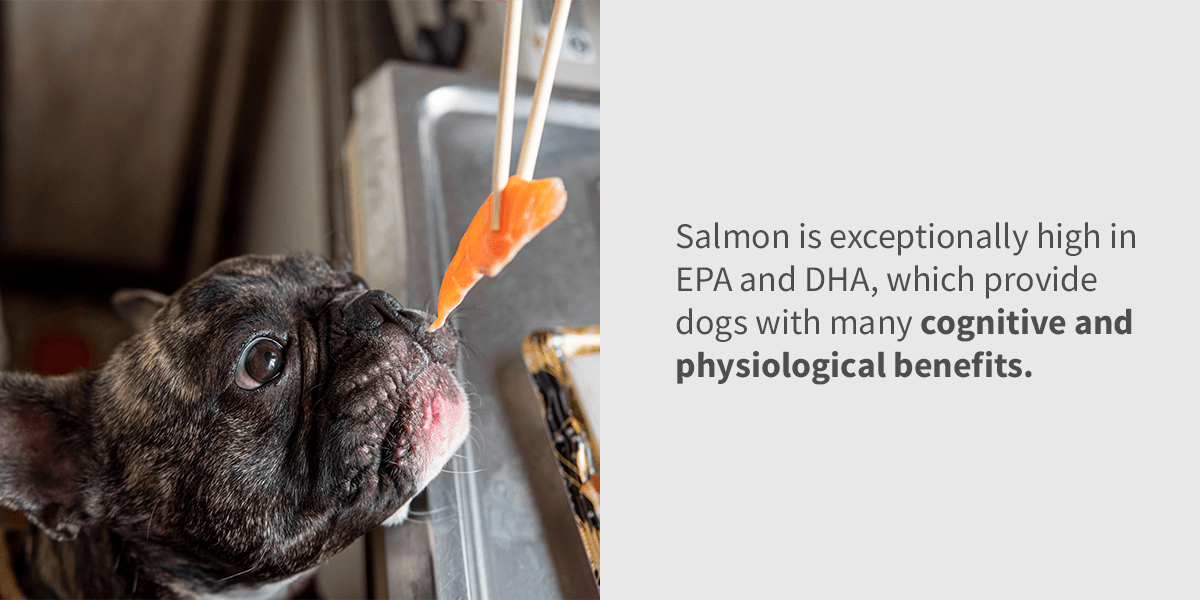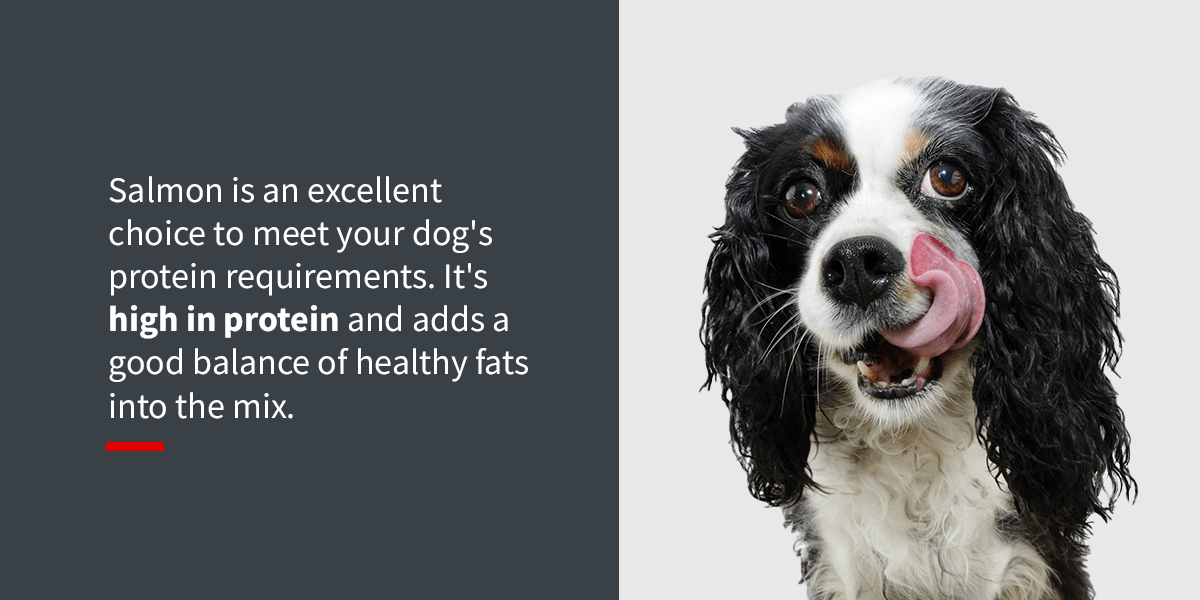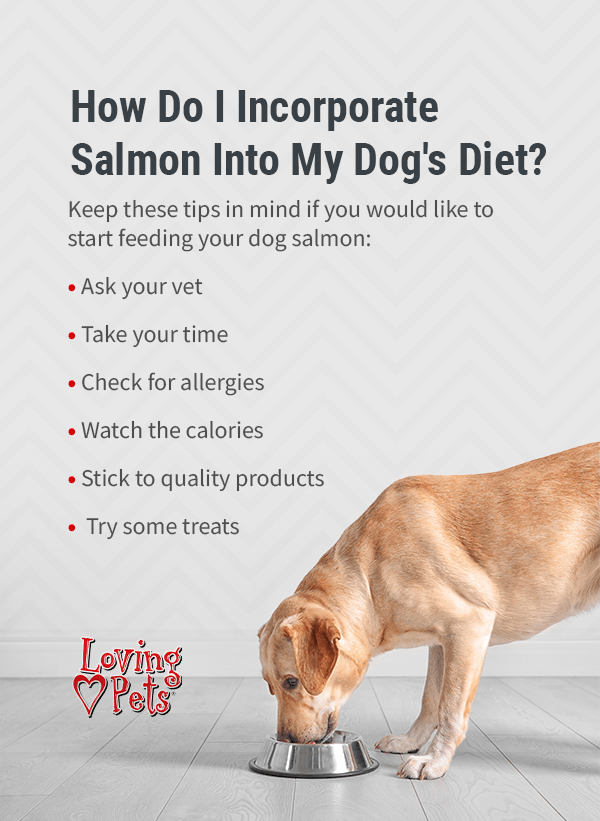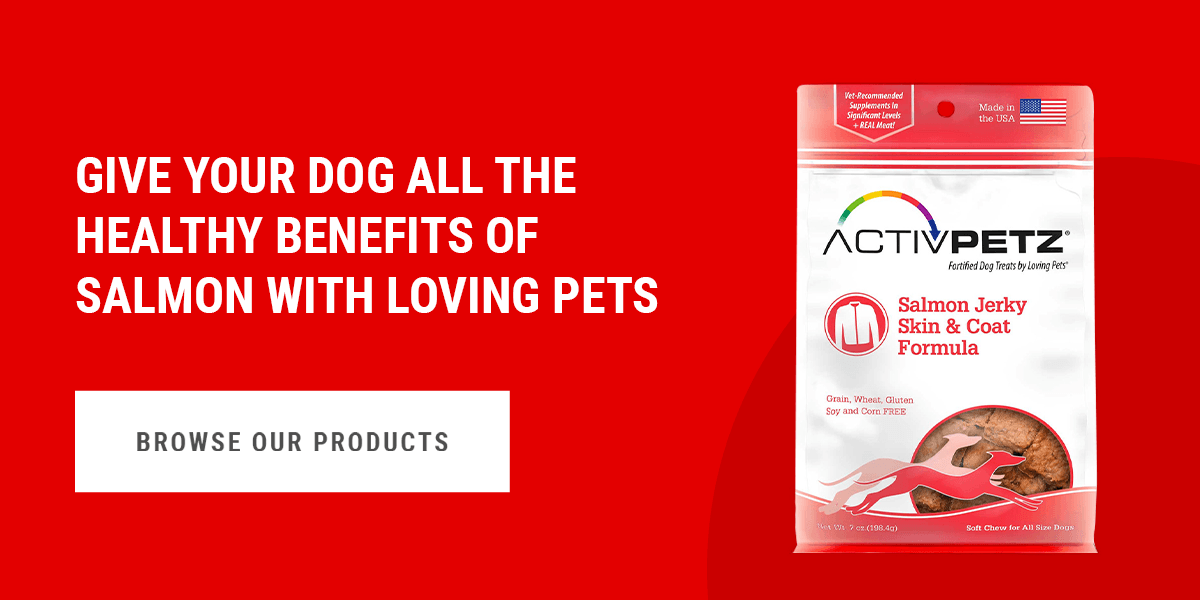The Benefits of Salmon for Dogs
As pet lovers, we always look for the most beneficial food and supplements for our furry friends. Knowing what to feed your dog and what not to can be challenging with so much conflicting information. We want them to live the healthiest lives, but providing them with the wrong foods could result in costly vet visits and overall discomfort for your pup.
Salmon has many well-documented benefits for human beings. The good news is that the same applies to dogs. Like us, dogs can't produce omega-3 fatty acids. They have to get them through their diet, and supplementing your dog's diet with salmon — providing you do so correctly — is an excellent way to give them those healthy fats.
Can Dogs Eat Salmon?
The short answer is yes. Dogs can eat salmon. It has many health benefits and makes an excellent addition to their diet. When prepared and served correctly, salmon can help many dogs lead a longer, healthier life and has even proven beneficial to dogs suffering from ailments like heart disease.
Should dogs eat salmon? Is salmon good for dogs? Incorporating salmon into your dog's diet is more complex than putting some raw salmon in a bowl and plopping it on the floor. Correct potion control and preparation significantly impact whether it's harmful or beneficial to your dog. Consider several options, including cooked salmon and salmon dog treats.
Salmon Dog Treat Benefits
Salmon can be a powerful supplement to your dog's regular diet. It has many health and cognitive benefits, including the following:
Provides Omega-3 Fatty Acids
Salmon has one of the highest omega-3 contents of all fish. Omega-3 fatty acids have many benefits for dogs since they must supplement them. Omega-3 fatty acids are essential for metabolic and physiological processes. There are three different types of omega-3 fatty acids:
- Alpha linoleic acid (ALA)
- Eicosapentaenoic acid (EPA)
- Docosahexaenoic acid (DHA)
Salmon is exceptionally high in EPA and DHA, which provide dogs with many cognitive and physiological benefits.

Produces Healthy, Shiny Coats
The oils in salmon, including omega-3, are fantastic for dogs' coats. They moisturize the skin from the inside, allow for greater flexibility and help eliminate dandruff. Omega-3s also help your dog's skin create a barrier, trapping moisture and preventing irritants and allergens from causing itchiness. Less scratching means less shedding, which is excellent for your dog's coat and your furniture.
Provides Vitamins
We often overlook micronutrients in our dogs' diets, but these little powerhouses assist with several critical physical processes, including energy production and reducing inflammation. Salmon is abundant in selenium and B vitamins, including the following:
- Folic acid
- Vitamin B12
- Thiamin
- Niacin
- Riboflavin
- Vitamin B6
- Pantothenic acid
- Vitamin D
Reduces Joint Pain
Joint disease can cause pain and immobility in your dog. Omega-3 fatty acids reduce joint pain and promote mobility in dogs with joint problems. Pain medications may still be necessary, but effective supplementation can only benefit your dog's health and happiness. Feeding your dog salmon could also help prevent joint problems in the future, as it lubricates their joints and has powerful antioxidant properties.
Improves Mobility
Dogs put pressure on their joints, whether playing, going for walks or through age and injury. In most cases, joint pain and stiffness result from joint tissue inflammation. Salmon is the perfect choice for fighting joint inflammation. It contains trace amounts of Astaxanthin, which aids in reducing inflammation. Astaxanthin is a powerful antioxidant that can reduce oxidative stress on your dog's joints, helping prevent joint damage.
Promotes Healthy Skin
The omega-3s in salmon are well known for producing healthy skin and coats. These fatty acids can protect your pup's skin from the harmful effects of ultraviolet rays, reduce sensitivity and increase moisture in the skin. They may also improve skin barrier function, which locks in moisture and keeps allergens at bay.
Promotes Healthy Heart Function
Salmon has anti-inflammatory and anti-arrhythmic properties that support dogs' heart health and may lower blood pressure. Salmon may be a good choice if your dog has current heart problems or you would like to take an active interest in their heart health.
Provides an Excellent Source of Protein
Dogs typically require more protein in their diets than we do. Protein is one of the most essential nutrients in any dog's diet, and without it, they'll experience problems such as weight and muscle loss, fatigue, poor digestion and weakness. Adult and medium-sized dogs require a minimum of 18% crude protein in their diet. They also need carbohydrates and fats.
Salmon is an excellent choice to meet your dog's protein requirements. It's high in protein and adds a good balance of healthy fats into the mix.

Assists in Brain Development
Salmon contains many nutrients essential for brain development in puppies and cognitive functioning in adult dogs. Omega-3s may improve memory and cognitive ability, which is good news for you if you're training your dog. Salmon may also improve cognitive functioning in older dogs.
Helps With Picky Eaters
Some dogs are just fussy eaters— if you have one, you know how frustrating it can be. Salmon and salmon-based treats might be the solution. The smell and texture are bound to pique your dog's interest. It's a highly palatable option, and many dogs actually prefer it to staples like chicken.
Even if your dog isn't particularly fussy regarding food, salmon and salmon treats are so good for your dog that it's a bonus that they will munch away without a second thought. Adding salmon to your dog's diet is the perfect way to incorporate all the health benefits without them even realizing it.
Provides a Highly Digestible Option
Salmon is highly digestible, especially in terms of protein options. Digestibility is the amount of food broken down by the digestive tract and absorbed by the body. Salmon is easy for your dog to digest, break down and use. It is gentle on the stomach and could be a solution if you have a dog with a sensitive tummy. Even if your dog displays no digestion sensitivity, salmon is an excellent option, as when you feed it to them, you know their body will use most of the nutrients.
Helps Manage Allergies
If your dog is allergy-prone, salmon may cause less of a reaction than other foods, such as beef and chicken. Due to the anti-inflammatory and moisturizing properties of omega-3, adding salmon to your dog's diet may even help with non-food-related allergies, alleviating the itching and inflammation caused by the allergen.
Salmon FAQs
Most pet owners have plenty of questions about something as important as diet. Below are some frequently asked questions, along with answers, to help you incorporate salmon successfully into your dog's diet.
Is Salmon Bad for Dogs?
Like all things, salmon is best served in moderation. It's high in fat, and you should limit your dog's intake to once or twice a week. If you're considering feeding your dog salmon to help with a particular ailment, like skin allergies, consult your veterinarian.
Raw or undercooked salmon is harmful to dogs. It may contain the Neorickettsia helminthoeca parasite, which causes salmon poisoning disease, which can be fatal. Some symptoms of salmon poisoning disease include the following:
- Discharge from the dog's nose and eyes
- Fever
- Vomiting and diarrhea
- Lack of appetite
- Dehydration
- Weakness
- Weight loss
- Depression
If you think your dog is suffering from salmon poisoning, take them to your trusted veterinarian as soon as possible. Inform your vet that your dog has eaten raw salmon and give them a breakdown of the symptoms. Your vet will probably test for the presence of the parasite and prescribe antibiotics. If your dog has diarrhea or vomiting, your vet may give them IV fluids to counteract the dehydration.
Raw salmon also contains small bones, which could be a choking hazard. Always buy deboned salmon if you're cooking it for your dog, and check for rouge bone fragments before serving.
How Should I Prepare Salmon for My Dog?
As you can see, correct salmon preparation is vital to ensure your dog gets the many benefits. Try and opt for fresh, boneless fillets and check for small bones before and after you cook your fish. Cook the salmon however you like — poaching, steaming, roasting and grilling are all options — and be sure not to add any spices, like salt, pepper or herbs.
If you're worried about cooking salmon from your dog, you're in luck. Some excellent salmon dog treats on the market provide all the benefits with none of the hassles. Choosing salmon training treats or jerky means you don't have to worry too much about portion control. If you buy them from a trusted manufacturer, you can rest assured that all the good stuff will be there.
Can I Batch Cook Salmon for My Dog and Freeze it?
Yes, you can. You can cook your dog's salmon, let it cool, dish out the appropriate portions and freeze them throughout the week.
Is Salmon Good for Puppies?
Puppies require more protein, vitamins and minerals than adult dogs, many of which you can find in salmon. As puppies are still developing cognitive and physical functions, this brain, skin, coat, and muscle food is an excellent choice during growth. Some principal benefits of salmon for puppies include the following:
- Helping muscle development
- Keeping skin and coats healthy
- Providing vitamins
- Assisting brain development
If you're cooking salmon for your puppy, it's even more critical to ensure it's cooked properly. Puppies' smaller size and undeveloped bodies make them more at risk of the devastating effects of salmon poisoning. A healthy salmon puppy treat could be the better option in the early developmental stages.
How Do I Incorporate Salmon Into My Dog's Diet?

Keep these tips in mind if you would like to start feeding your dog salmon:
- Ask your vet: Always check with your vet before you make significant changes to your dog's diet.
- Take your time: Introduce salmon slowly into your dog's diet. It's high in fats and could make them sick if they have too much. Start with a small amount and build up to the recommended portion for their weight and size.
- Check for allergies: If you don't know whether your dog has a fish allergy, err on the side of caution. Start with small amounts and observe your dog for signs of illness or discomfort. Salmon is one of the most beneficial foods you can give your dog, but every pet is different.
- Watch the calories: Salmon probably contains more calories than your dog is used to eating. If you plan on feeding salmon as part of your dog's regular diet, you may have to adjust their other foods to account for the calorie intake.
- Stick to quality products: Your dog's well-being is the most crucial factor and choosing low-quality salmon products is less likely to provide them with all the benefits of having salmon in their diet.
- Try some treats: Salmon dog treats are specially formulated to contain just the right amount of nutrients. They also come in bite-size pieces, making the introduction phase much more straightforward. Dogs love them, so they're excellent for training. Salmon dog treats could be the ultimate reward for a good dog.
Can I Give My Dog Smoked Salmon?
Smoked salmon is cured, so it contains a lot of salt. Too much salt can give your dog sodium ion poisoning and provides little nutritional benefit. It's best to stay away from smoked salmon. If your dog accidentally ingests smoked salmon, there is no need to panic. Inform your vet just in case, and keep watch for any signs of discomfort.
Can I Give My Dog Any Fish?
Many types of fish are excellent additions to your dog's diet, but not all. Salmon is one of the most nutritious fish you can feed your dog, but other safe and healthy fish include:
- Canned light tuna fish
- Whitefish
- Whiting
- Flounder
- Cod
- Herring
- Catfish
Some fish species are older when harvested, which means they're more likely to have high mercury levels in their tissue. They also have parasites throughout their bodies, which can harm your dog.
Try and stay away from farm-raised fish as well. They may have increased levels of antibiotics and other toxins in their bodies. Keep your dog safer by avoiding the following types of fish:
- Shark
- Albacore tuna
- Swordfish
- King mackerel
- Tilefish
Can I Use Salmon in Dog Training?
Of course. Cooked salmon might be challenging, but quality salmon training treats are the perfect high-value reward to keep your dog focused on you and excited for their praise. If you use salmon for training, be mindful of the extra calorie intake. Training treats are perfect as they account for the extra calories and will balance these with other healthy ingredients.
Give Your Dog All the Healthy Benefits of Salmon With Loving Pets
If you feel like now is a good time to go that extra mile for your dog and add supplementation to their diet, Loving Pets is here to help you with our range of delicious treats, made with real meat and simple ingredients, made right here in the USA. We know you want to do the best for your dog, and we're here to help you achieve that with our extensive range of products to suit your needs and budget.
You can find almost anything you need at Loving Pets, from high-quality treats to gorgeous dog bowls and slow-feeding accessories. Our dedicated attention to ingredients and our focus on providing the best customer for our human and canine patrons makes our family-owned business stand out from the crowd. It's our personal attention to you and your pets that sets us apart. Feel free to browse our innovative and quality products whenever you like, locate a store near you or contact us today, and one of our passionate and caring staff members will answer any questions.




